
Open Praxis
Scope & Guideline
Empowering distance learning through innovative research.
Introduction
Aims and Scopes
- Open Educational Resources (OER):
The journal emphasizes the development, implementation, and impact of OER in various educational contexts, highlighting best practices and innovative approaches to enhance teaching and learning. - Distance and Online Learning:
Open Praxis explores methodologies and strategies for effective distance and online education, focusing on student engagement, instructional design, and the integration of technology. - Educational Equity and Accessibility:
The journal addresses issues of equity in education, particularly how open education can provide opportunities for marginalized groups and foster inclusivity in learning environments. - Generative AI and Digital Transformation:
Research on the role of generative AI and other digital tools in transforming educational practices is a key focus, with an emphasis on their implications for teaching, learning, and assessment. - Critical Pedagogy and Educational Practices:
Open Praxis advocates for critical perspectives on education, exploring how theory and practice can coalesce to promote transformative learning experiences. - Impact of COVID-19 on Education:
The journal documents and analyzes how the COVID-19 pandemic has reshaped educational practices, focusing on lessons learned and future implications for open and distance education.
Trending and Emerging
- Generative AI in Education:
There is a significant increase in publications exploring the implications of generative AI technologies for educational practices, including their potential to enhance learning and teaching methodologies. - Equity and Inclusion in Open Education:
Recent papers emphasize the importance of equity and inclusion within open education frameworks, addressing how these principles can be operationalized to support diverse learner populations. - Critical Data Literacy:
An emerging focus on critical data literacy is evident, with research investigating how learners can navigate, analyze, and utilize data in a responsible and informed manner. - Innovative Pedagogical Frameworks:
The journal is increasingly featuring studies that propose and evaluate innovative pedagogical frameworks, particularly those that leverage technology to foster collaborative and engaged learning. - Impact of COVID-19 on Educational Practices:
The ongoing exploration of the pandemic's impact on education continues to trend, with a focus on adaptive strategies and lessons learned for future educational resilience.
Declining or Waning
- Traditional Assessment Methods:
There is a noticeable decline in research focused on conventional assessment methods as the journal increasingly prioritizes innovative and equitable assessment strategies that align with modern educational practices. - Content Delivery Models:
Research centered on traditional content delivery models is becoming less frequent, indicating a shift towards more interactive and learner-centered approaches in educational research. - Single-Discipline Focus:
Papers that concentrate solely on a single discipline without cross-disciplinary perspectives are decreasing, as the journal increasingly values interdisciplinary approaches to educational challenges. - Physical Classroom Dynamics:
With the rise of online and hybrid learning models, studies focusing exclusively on physical classroom dynamics are becoming less relevant, reflecting a broader trend towards digital and remote education. - Siloed Technology Use:
Research that examines technology use in isolation from broader pedagogical frameworks is waning, as the journal emphasizes integrated and holistic approaches to technology in education.
Similar Journals
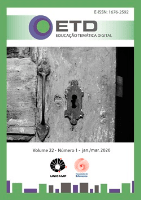
ETD Educacao Tematica Digital
Advancing Knowledge in Thematic Digital EducationETD Educacao Tematica Digital is a distinguished academic journal published by UNIV ESTADUAL CAMPINAS, FAC EDUCACAO, and has been at the forefront of educational research since its inception in 2004. With a focus on digital education and thematic approaches, this open access journal facilitates the dissemination of knowledge and innovative practices in the field of education, making it an invaluable resource for researchers, educators, and students alike. Its dedicated editorial board fosters discourse on the integration of technology within educational frameworks, ensuring the publication of high-quality articles that resonate with contemporary challenges and advancements in education. The journal’s commitment to accessibility and scholarly rigor positions it as a leading venue for those seeking to advance their understanding and application of digital pedagogies. With the ISSN 1676-2592, ETD aims to contribute significantly to the global discourse on educational methodologies and digital learning environments.
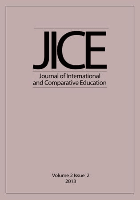
Journal of International and Comparative Education
Illuminating Diverse Educational SystemsJournal of International and Comparative Education, published by UNIV MALAYA PRESS, is a premier platform dedicated to the exploration of educational systems across diverse cultural contexts. With its commitment to Open Access since 2012, the journal ensures that vital research findings reach a global audience with no barriers, making it an essential resource for scholars, practitioners, and policymakers alike. The journal aims to facilitate discourse among international researchers by delving into comparative studies that inform educational practices and policy development. Based in Kuala Lumpur, Malaysia, this journal serves as a critical vehicle for enhancing the understanding of educational issues and trends worldwide, striving to impact both regional and global education landscapes.
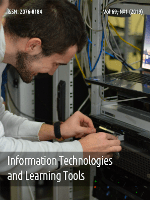
Information Technologies and Learning Tools
Leading the Charge in Digital Learning Innovations.Information Technologies and Learning Tools is a pioneering scholarly journal dedicated to the exploration and dissemination of knowledge within the rapidly evolving field of educational technology. Published by the NATIONAL ACADEMY OF EDUCATIONAL SCIENCES OF UKRAINE, INSTITUTE OF DIGITALIZATION EDUCATION, this journal has maintained its Open Access policy since 2006, ensuring that groundbreaking research is readily available to educators, researchers, and practitioners worldwide. With the ISSN 2076-8184, the journal serves as a critical platform for innovative studies focusing on the integration of information technologies into educational practices, seeking to bridge gaps between digital tools and effective learning methodologies. Despite the absence of specific rankings, its commitment to advancing educational theories and applications positions it as an essential resource for professionals and students striving to enhance learning experiences through technology. As the educational landscape continues to transform, Information Technologies and Learning Tools stands at the forefront, fostering collaboration and knowledge sharing across diverse academic communities.
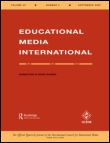
Educational Media International
Connecting theory and practice in educational media.Educational Media International, published by Routledge Journals, Taylor & Francis Ltd, is a premier journal in the interdisciplinary fields of Communication and Education, with a commendable Q2 ranking in both categories as of 2023. Established in 1978, this journal serves as a significant platform for the dissemination of innovative research that explores the evolving intersection of media technologies and educational practices. With an emphasis on both theoretical and practical applications, it addresses crucial topics such as digital learning environments, multimedia educational resources, and the impact of social media on education, making it an essential resource for researchers, professionals, and students alike. Located in the United Kingdom, Educational Media International not only contributes to the academic discourse but also reflects global trends and challenges in education, fostering a deeper understanding of the vital role media plays in shaping learning experiences worldwide.

ReiDoCrea-Revista Eectronica de Investigacion y Docencia Creativa
Advancing Creative Pedagogy for a Global AudienceReiDoCrea-Revista Electrónica de Investigación y Docencia Creativa is a distinguished academic journal published by UNIV GRANADA, FAC CIENCIAS EDUCACION, aimed at advancing research and innovative teaching practices in the field of education. With its inception in 2012, this Open Access journal ensures that research findings and educational strategies are accessible to a global audience, fostering collaboration and development among educators, researchers, and students. While its H-index is currently not specified, ReiDoCrea is committed to publishing high-quality, peer-reviewed articles that stimulate scholarly dialogue and reflection on pedagogical innovation. Its relevance in the educational landscape is underscored by its focus on creative approaches to teaching and learning, making it an essential resource for those seeking to enhance educational practices. With a commitment to impactful research dissemination, ReiDoCrea provides a vital platform for sharing insights and innovations that contribute to the evolution of educational methodologies.
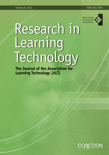
Research in Learning Technology
Fostering Global Collaboration in Learning Technology ResearchResearch in Learning Technology, published by the Association for Learning Technology (ALT)impact factor, the journal has consistently ranked in the top quartiles of both the Education (Q1) and Computer Science Applications (Q2) categories as of 2023, highlighting its significance and influence in the academic community. The journal is committed to disseminating high-quality research and practical insights that bridge the gap between technology and pedagogy, making it an essential resource for researchers, educators, and practitioners alike. The Scopus rankings further emphasize its reputation, placing it in the top 10% of social sciences education journals. As an open-access journal, Research in Learning Technology ensures that its valuable content is freely accessible, empowering a global audience to drive innovation in learning technology. Whether you are a seasoned researcher or a student exploring this dynamic field, this journal serves as a vital platform for sharing knowledge and advancing the discourse in learning technologies.

Journal of Information Technology Education-Research
Empowering Education Through Innovative Technology ResearchThe Journal of Information Technology Education-Research, published by the Informing Science Institute, stands as a pivotal resource in the field of educational technology and computer science. With an ISSN of 1547-9714 and an impressive E-ISSN of 1539-3585, this journal aims to disseminate high-quality research and innovative practices that enhance the integration of information technology in educational contexts. It has achieved commendable rankings, notably Q2 in Computer Science (miscellaneous), Q1 in Education, and Q2 in E-learning for the year 2023, reflecting its significance and impact in these domains. Within the Scopus metrics, it ranks #178 out of 1543 in Social Sciences Education and #50 out of 232 in General Computer Science, positioning it in the top percentiles of its fields. This journal is dedicated to fostering scholarly discourse and providing a platform for educators, researchers, and professionals to share their findings and insights, contributing to the advancement of knowledge and practices in information technology education. The journal covers research from 2011 to 2024, ensuring a comprehensive collection of contemporary studies that engage with current trends and challenges in IT education. For scholars seeking an open-access platform to disseminate their work, this journal presents an invaluable option to engage with a broad academic audience.
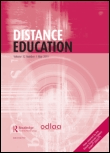
Distance Education
Leading the Charge in Distance Learning ResearchDistance Education is a premier academic journal published by Routledge Journals, Taylor & Francis Ltd, specializing in the dynamic and rapidly evolving fields of education and e-learning. With an impressive impact reflected in its Q1 rankings in both education and e-learning categories for 2023, this journal stands out as a leader in disseminating high-quality research and innovative practices that inform and inspire educators, policymakers, and researchers globally. The journal has been at the forefront of distance education studies since 1980 and continues to provide critical insights into pedagogical approaches, technological advancements, and learner engagement methodologies. Although it does not offer open access options, its rigorous peer-review process ensures that contributions are both impactful and relevant. Located in the United Kingdom at 2-4 Park Square, Milton Park, Abingdon, OX14 4RN, Oxon, England, it serves as an essential resource for anyone invested in the future of education, aiming to bridge the gap between traditional and online learning environments.

Independent Journal of Teaching and Learning
Elevating the Discourse on Teaching and Learning.Independent Journal of Teaching and Learning is a prominent publication dedicated to advancing the discourse within the field of education. Published by the Independent Institute of Education (IIE), this journal serves as a platform for researchers, educators, and practitioners to disseminate their findings and innovative practices related to teaching and learning methodologies. With an ISSN of 1818-9687, the journal emphasizes open access to foster widespread knowledge sharing and accessibility among its readers. The journal is strategically positioned in South Africa, situated at ADVTECH HOUSE, INANDA GREENS, 54 WIERDA RD W, WIERDA VALLEY, SANDTON, and aims to provide rigorously peer-reviewed content that supports the professional development of educators while addressing contemporary challenges in education. Recognized for its commitment to quality scholarship, the Independent Journal of Teaching and Learning is an indispensable resource for anyone engaged in the pursuit of educational excellence.

E-Mentor
Transforming Mentorship through E-Learning InsightsE-Mentor is a prominent academic journal published by WARSAW SCHOOL OF ECONOMICS, dedicated to the fields of educational technology, mentorship, and online learning. With its ISSN 1731-6758 and E-ISSN 1731-7428, E-Mentor provides a vital platform for researchers, educators, and practitioners to publish and disseminate their findings in the rapidly evolving digital education landscape. The journal is committed to open access principles, ensuring that innovative research reaches a global audience without barriers. Aimed at bridging the gap between theory and practice, E-Mentor explores critical themes such as virtual mentorship models, e-learning methodologies, and the integration of technology in educational environments. By fostering collaboration and knowledge exchange, E-Mentor plays an essential role in shaping educational practices and advancing research in the digital age.